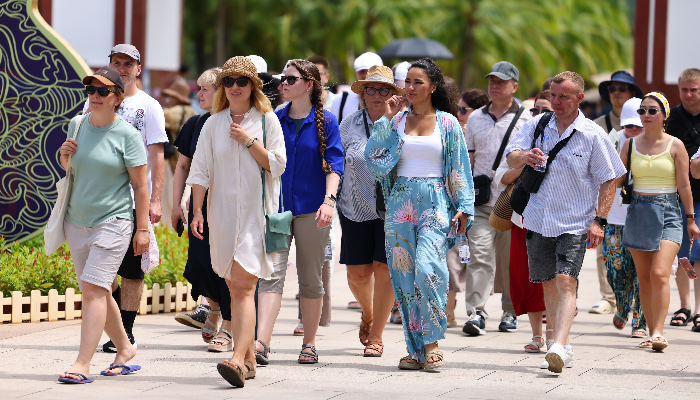By continuing to browser our site and use the services you agree to our use of cookies, Privacy Policy and Terms of Use. You can change your cookie settings through your browser.


China mourns COVID-19 victims on April 4
China held a national mourning Saturday for martyrs who died in the fight against the novel coronavirus disease (COVID-19) outbreak and compatriots died of the disease, according to the State Council. During the commemoration, national flags flew at half-mast across the country and in all Chinese embassies and consulates abroad, and public recreational activities are suspended across the country.
At 10:00 a.m. Saturday, Chinese people nationwide observed three minutes of silence to mourn for the diseased, while air raid sirens and horns of automobiles, trains, and ships wailed in grief.
At 10:00 a.m. on April 4, the air raid siren and horns of vehicles rang instantly. In the waiting hall of Haikou Automobile Passenger Terminal, the staff and passengers bowed their heads in silence. More than 30 Haiqi Express automobiles whistle together to mourn for the martyrs and compatriots died of the disease.












Qingming Festival
Qingming Festival (also known as Tomb-sweeping Day), which falls on either April 4th or 5th of the gregorian calendar, is one of the Chinese Twenty-four Solar Terms. From that date temperatures begin to rise and rainfall increases, indicating that it is the crucial time for plowing and sowing in the spring. The festival therefore has a close relationship with agriculture. However, it is not only a seasonal symbol; it is also a day of paying respect to the dead, a spring outing, and other activities.
Qingming Festival of 2020 falls on April 4. According to traditional customs, people will worship ancestors, tomb-sweeping, and hold some public memorial activities. But the pandemic made this year's Qingming Festival different from the past. In order to avoid imported COVID-19 cases and other risks, according to the pandemic prevention and control requirements, announcements have been issued in various places across the country to suspend on-site tomb-sweeping.
Traditional Customs of Qingming Festival
Tomb sweeping is regarded as the most important custom in the Qingming Festival from which the name of Tomb-sweeping day is got. Cleaning the tomb and paying respect to the dead person with offerings are the two important parts of remembering the past relatives. Weeds around the tomb are cleared away and fresh soil is added to show care of the dead. The dead person's favourite food and wine are taken to sacrifice to them, along with paper resembling money. This is all burned in the hope that the deceased are not lacking food and money. Kowtow before the tablets set up for the dead are made.
Festivals for honoring the deceased from across the world
Orchid Basin Festival
Falling on July 15th according to the lunar calendar, Orchid Basin Festival is one of the big events in Japan all people observe. Japan usually gives people 3 days off to go back to their hometowns to pay respect to their ancestors. It is said that the ancestors' spirits will return home, and so each household put fire basins outside at the gate and hang lanterns for the spirits to find their way back.
Diwali-Festival of Lights
Diwali or Deepavali, the festival of "rows of lights", is one of the most important of all Hindu festivals. People place candles on the stairs, hallway and balcony at home when night falls that day to pay respect for the deceased and pray for the family. Lighting lamps and candles during the festival is also considered auspicious by bringing light, knowledge and eternal life from darkness, ignorance and death.
All Soul's Day
All Soul's Day, also called the "Day of the Dead" usually occurs on November 2, when families fondly remember the deceased by praying before an altar. It's also a time marked by festivities, including parades of skeletons. In one notable tradition, revelers lead a mock funeral procession with a live person inside a coffin.
Day of the dead
Poland and most of the Catholic world have celebrated the festival for many centuries. Also known as All Saints Day, it's a national holiday when people all over Poland visit the graves of loved ones and to place candles and flowers at tombstones. The candles, which can burn for hours, are placed to help the departed souls find the way home.

FTP Expert Talks | Xiaodong Lee, Vice President of the Internet Society of China and Founder of the Fuxi Institution: Hainan is the "Nebula" of New Digital Youth
09:47, 12-September-2025Hainan Issues Offshore RMB Bonds in HK for 4th Consecutive Year
09:46, 12-September-20252025 Hainan FTP International Students Content Creation Project
02:28, 12-September-2025What Makes "Hainan Travel" So Appealing?
09:38, 11-September-2025100 Days to Go: What's Next for Hainan-Hong Kong Cooperation?
09:38, 11-September-2025Expert Talks Ep. 4: The Future of the FTP's Digital Economy
09:35, 11-September-2025By continuing to browser our site and use the services you agree to our use of cookies, Privacy Policy and Terms of Use. You can change your cookie settings through your browser.





